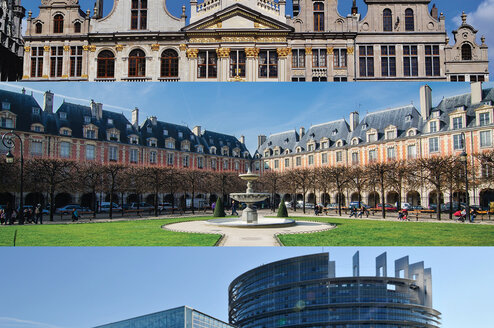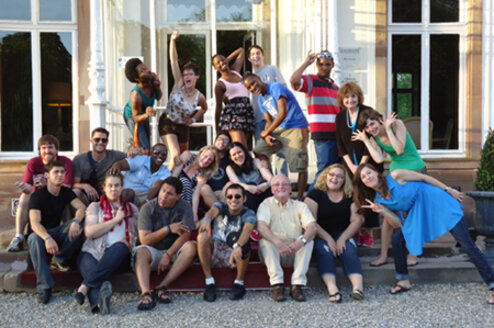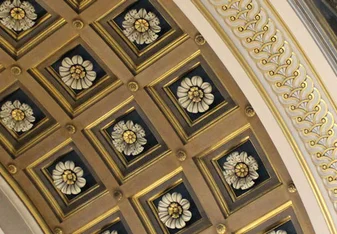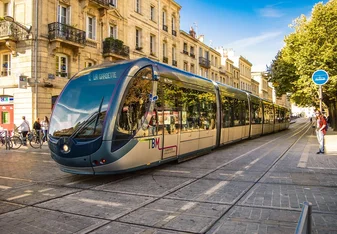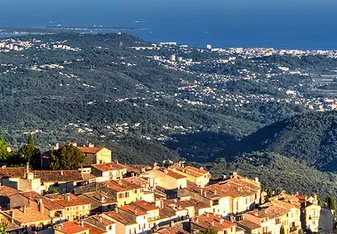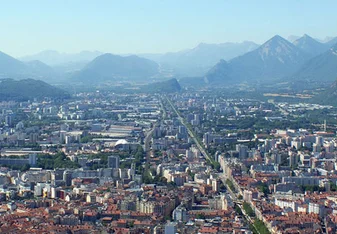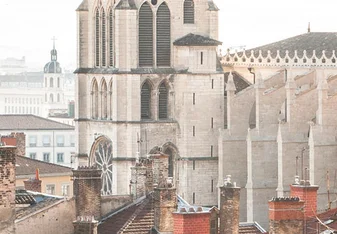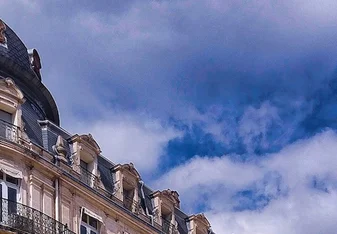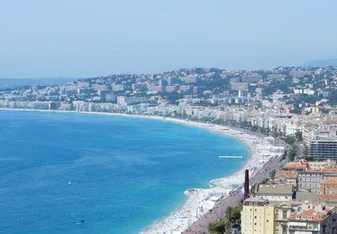Study Abroad Programs in Strasbourg, France
Study Abroad Programs in Strasbourg
About
In search of adding an international dimension to your studies? Would you like to pursue your dream career in the capital of Europe? Then forget Paris, the real center of the action is Strasbourg.
The City of Roads is located in northeastern France with only the Rhine River separating it from Germany and high-speed trains linking it to Luxembourg, Brussels, and Basel in a matter of a couple hours. It is also home to the Council of Europe, the European Parliament, and Court of Human Rights, meaning there is plenty of opportunity to learn and gain academic and professional experience.
Despite its high order, the walkable layout and whimsical UNESCO classed medieval downtown in Strasbourg make it more plausible as a fairytale village lost in time. And what better way to truly take in the magic of Strasbourg than as a student!
Life & Culture
Strasbourg has historically jumped back and forth between German and French dominion; therefore, the locals developed a language to ensure that they could say what ever they wanted about the invaders without being understood. This language was called Elsässisch, or Alsatian and is more of a dialect of German than French.
In many ways, for example in the neatness of yards and the flower bedecked windows of neatly preserved timber beamed houses, the region of Alsace is reminiscent of an ancient Bavaria. But, the quality of the wine and the croissants prove they have preserved the dearest aspects of their nation. The pace is slow yet punctual and the locals can seem aloof and reticent at first but once you become friends it is a true and lasting bond.
Culture & Immersion
When in France, if you don't know some French it may make interactions with locals and day-to-day transactions frustrating and boggling -- but not to fear, Strasbourg is not your typical place. Due to its geographical position at the crossroads of Europe and nearness to Germany locals are used to hearing other languages and are more apt to be multilingual themselves. While knowledge of French or German will give you an edge to making connections there are many other ways to immerse yourself in the culture and enjoy all that makes this place unique.
Culture Shock & Support
Being such an internationally-oriented and cosmopolitan destination, it would be difficult to imagine feeling a sense of overwhelming shock, but being a city that boasts a 20% foreign student population they have resources well in place for any issue should it arise.
CAMUS is the University of Strasbourg's branch providing counseling and psychological services free of charge to anyone who is studying there. Student buddies are also available through CAMUS and other student associations so there is always someone to reach out to no matter what issues you may be facing.
Lifestyle
The French lifestyle has narrowly beaten out the German one therefore you can find certain cafes and old taverns bustling with students studying while sipping espressos and café cremes occasionally or sprawled on benches, walkways or in the grass during sunny days. There is a compulsory order to fully savor and share meals which are still lingered over much more than in any Anglo-Saxon country (as the French still refer to the Brits and thus any English speaker).
Insider Tips
Strasbourg is the bicycling capital of France so if you want anyone to take you seriously or expect to have right-of-way you may consider investing in a second-hand bike once there. The tram is also quite good but no other mode of transport will get you over the Rhine into Germany or from school and back cheaper and quicker than peddling. That way you'll have more time and money to enjoy flammkuchen (the Alsatian creamy pizza also known by its French name, tarte flambée) and a glass of local Riesling or Pinot Blanc. Bon Appétit!
Planning Your Trip
In France, a university year is divided into two semesters: the first semester from September to January and the second semester from January to May. Higher education is based on three levels. The licence is three years right after passing the entrance exams after high schoo , the Masters is two years and the Doctoral or PhD is a minimum of three years. The grading system is a bit different and ranges from 0 to 20; 20 being perfect so never given to any mortal student. A grade of 12 is considered satisfactory and you will swing from the chandeliers if you ever are lucky enough to obtain above a 16, which is outstanding.
Course Types
Certain universities offer semester or summer programs in Strasbourg so if you are already enrolled in school you could ask your advisor about the programs offered. Once admitted, travel arrangements are made by your school and all you need to do is decide the classes you want to study from the available ones offered through your University's study abroad program. Strasbourg, being a European capital specializes in Political Sciences, but you can find courses in many arts and sciences fields, communications, economics and international business, music, and of course French language and literature.
Third-party providers also offer programs, such as CEPA Foundation's EU Studies Program which arranges for students' accommodation in the 18th century castle and includes guided visits, language classes and much more. If you are not currently a student and have a basic grasp of French, you can directly register at The University of Strasbourg which offers mainly one and two year Master's in French and English and anyone with the necessary level of previous education can apply.
Housing
Since 2015 international students and others have had the chance to stay in one of the 170 modern studio apartments in La Maison Universitaire Internationale, which is also home to a welcome desk, providing resources to foreign students, a student cafeteria, guided tours and French classes.
There are other numerous student residences mainly operated by Crous, which offer rooms and apartments starting at €100 ($125) per month. There is also La Carte de Colocs, a free site started by roommates in Strasbourg where you can directly find and reserve your own room in a shared apartment.
Transportation
Students can access their Pass Campus after filling out an online form and then they can add money manually just as with the cafeteria through an online payment system called Izly. This pass allows for a deep discounted price on all travel on the very complete bus and tram network.
Strasbourg is blessed with great environmentally-friendly modes of transport besides a tram running on an electric line it also boasts the best cycling lanes in France. You can get anywhere in Strasbourg quickly while enjoying the scenery by bike which can be rented by the hour, week or year from Velhop and of course, there is a student discount. There are also used bikes available at outdoor sales called vide-greniers and websites such as leboncoin.
Costs & Funding
La vie est belle for students in France. Just having a student card allows for advantageous discounts at every corner, from cinemas and swimming pools to cell phone subscriptions and bus tickets. In addition, many museums are free upon a simple flash of your card.
The Euro (€) is the currency in France as in 15 other E.U. member states. Upon arrival you will need to open a bank account as it will be quite complicated to pay or receive money without one. You will also not be able to receive housing aid or other benefits without one. Plus, in France you don't have to pay for things like tuition or apartment tax upfront but in multiple installments, but only with a local bank identity (RIB).
Cost of Living
Expenses are relatively high for France, but government subsidizing for public goods can make what would normally be a fortune into affordable for all. Education is a shining exemplar of cost efficiency. The most expensive are business schools where a master degree program runs at between €6,000-€9,000 ($7,500-$12,000) per year including fees. Except if you are coming through an exchange program from another university, tuition in a regular degree program rarely exceeds €600 ($75) for an entire academic year for both French and international students. You will be required to register for social security which costs about €215 ($265) unless you are under 28 and from a member EU state.
Rent for a one-room apartment in the heart of the city costs between €400-€600 ($500-$750) but the CAF, a governmental aid body will reimburse you up to 200 euros per month if you apply. Other costs will depend on your standard of living. Dining out at an inexpensive restaurant can set you back an average of €12 ($15) per person up to €25 ($30) for a three-course meal in an upper-end spot. Whereas a University meal using the money you put on your card account is €3.20 ($) and includes an appetizer, main, and cheese or desert.
Visas
If you are coming for a summer program or wish to stay for less than 90 days the majority of time you will not need a visa. Otherwise, the most common student visa available to Americans, Australians and others is the French VLS-TS (long-stay visa) which allows for a stay in France for one year and can be renewed for additional years until one's studies are completed.
If possible you should apply at least three months before the start date of your program. The application costs around €100 ($125) and may require a personal interview and a follow-up medical exam in France. You should contact the French consular authority nearest to you or have a look at the French government website to see visa specifics and access application forms for your country. If you have nationality to any one of the European Union member states you just need to make sure to bring a valid travel ID document such as a passport and you're ready to go. However, if you are from Britain, there is a possibility that new visa requirements will be put into place due to Brexit.
Can You Work While Studying in Strasbourg?
A study visa allows you to work, but only for a maximum of 964 hours (roughly 20 per week) in a one year period. If you are offered a full-time position during your studies or after you can then use that to apply for a work permit which allows you to live and work in France for the specified duration. Check the dates and make sure you renew your carte de sejour or residency permit on time.
Scholarships
The French government offers a number of awards known as BGF (Bourse du Gouvernement Français) each year and recipients are nominated by the cultural sector in the French Embassies. and if successful given a generous monthly allowance. The ministry of Foreign Affairs awards Eiffel scholarships to students with an excellent academic record who wish to pursue a master's or doctoral degree. It is for students in the fields of political science, law, economics and engineering. You should make sure you have applied for your scholarship well in advance of departing from your country as the amount of paperwork and documents needed to apply are typical by French administrative standards but daunting for the uninitiated.
